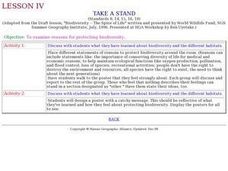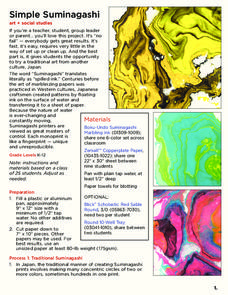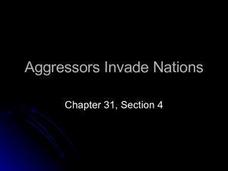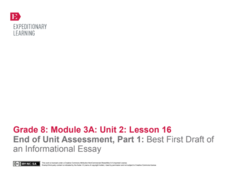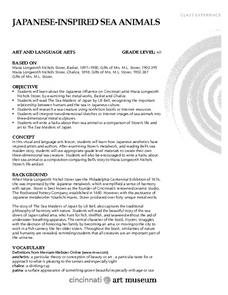Curated OER
The Japanese Military Build-up
Students evaluate the state of Japan's military and their defense strategy under the current Shinzo Abe administration. They watch the film, 'The Raping of Nanking' and read "The Return of Japanese Militarism: Rising Sun" by Joshua...
Curated OER
Isamu Noguchi/Stone Sculpture
Students examine the art and history of Japan and use it to help them conceptualize and create a work of art that reveals something about their own culture. They examine, interpret and analyze Noguchi's work and reveal information...
Curated OER
Would You Like to Attend School in Japan?
Sixth graders construct pro and con T-charts about their education system and that of Japan. They choose which system they prefer and give five reasons for it. Their reasons must be based on strong arguments and evidence.
Curated OER
Geography: Japan Project Online Lesson, Part 2
Young scholars, in small groups, create and exchange map questions and share them with students in Japan. After examining the maps, they compare and contrast the two maps on the county Web Board. Young scholars use a rubric to evaluate...
EngageNY
Building Background Knowledge: The Pearl Harbor Attack: Unbroken, Pages 38–47
Perspective changes everything. Scholars use a close reading guide while analyzing pages 38-47 in Unbroken. Readers learn that the governments of Japan and the United States had very different perspectives about the attack on Pearl...
Curated OER
Simple Suminagashi
What a wonderful way to meld art and culture! Learners create art work in the Suminagashi style using this detailed lesson plan. This art form, which is Japanese in origin, employs ink to create beautiful results. This will be a hit with...
Curated OER
Our Disastrous World
Students explore natural disasters around the world from the experiences of other students, friends and families. They collaborate with countries such as Japan, China, India, Australia, Russia, Great Britain as well as from the United...
Curated OER
Aggressors Invade Nations: WWII
What makes a World War? As it sounds, it's a war in which the world is involved. This presentation really defines the struggles, invasions, and conflicts that occurred all over the globe at the dawn of the Second World War. It describes...
Curated OER
History of English
Did you know that in Japan you can drink "Poccari Sweat"? Ever heard of "Intervocalic fricatives become contrastive?" Sure. All this and more in a presentation that traces the history of English before England, in England including Old...
Curated OER
Asian Art
Art from early China, Korea, and Japan is historically significant. Present these stunning images to your class, while you explain art movements that define traditional Chinese, Korean, and Japanese time periods and culture. Note: This...
Curated OER
Hiroshima: Question Answer Response Strategy (QAR)
“The crux of the matter is whether total war in its present form is justifiable. . .” After reading “The Aftermath,” the final chapter of Hiroshima, class members use a Question Answer Response (QAR) strategy to reflect on issues raised...
Rutgers University
How the Allies Won World War II: Island-hopping in the Central Pacific
Using primary source documents, young historians explore the strategies the US used to defeat Japan during WWII. They also learn about the American military experience, and innovations that changed the style of warfare. Learners benefit...
Curated OER
Contents and Containers
There is no better way to understand a different culture than to participate in its traditional or ceremonies. This lesson kicks off with a discussion about a tea container made during the Edo period in Japan. After examining the vessel...
Carolina K-12
The End of World War II: Pearl Harbor, Japanese Internment Camps, and the Atomic Bomb
The end of World War II saw major events that would forever change the global landscape and international relations. Using a fantastic PowerPoint presentation and several primary source documents, your learners will discuss the...
Science Matters
Earthquake Building/Shaking Contest
Japan is one of only a handful of countries that constructs buildings that are almost earthquake proof. The 13th lesson in the 20-part series challenges scholars to build structures to test against earthquakes. With limited materials and...
Polar Trec
Playground Profiling—Topographic Profile Mapping
The Kuril islands stretch from Japan to Russia, and the ongoing dispute about their jurisdiction prevents many scientific research studies. Scholars learn to create a topographic profile of a specific area around their schools. Then they...
EngageNY
Building Background Knowledge: “War in the Pacific,” Part 2
Who did what? Readers take a closer look at War in the Pacific to determine each country's actions. As they read, scholars underline American actions in one color and actions of Japan in another. They then begin completing Pearl Harbor...
EngageNY
Studying Conflicting Information: Varying Perspectives on the Pearl Harbor Attack, Part 2
Scholars take another look at Japan's Fourteen-Part Message. They then take turns adding ideas to sentence starters to create ideas about the different perspectives of government. To finish, groups mix and mingle to share their sentences...
EngageNY
End of Unit Assessment, Part 1: Best First Draft of an Informational Essay
This is just the beginning. Learners take the first step toward their end-of-unit assessments of Unbroken. They use their tools and knowledge gained from the unit to create first drafts of their informational essays. Writers then respond...
Curated OER
Creative Writing: Haiku
Haikus by Basho, Buson, Issa, and Shiki are used as models for a brief lecture on the importance of poetry in Japan's history and the structure of this poetic form. Students then go on a nature walk, record impressions, and return to the...
Curated OER
Japanese-Inspired Sea Animals
Students explore the Japanese influence on Cincinnati artist Maria Longworth Nichols Storer, by examining her metal works, Basket and Chalice. They research a sea creature using nonfiction books or Internet resources. Students write a...
Curated OER
A Yen for Maximum Residue Limits in Food
Future public health officials or agriculturists read an article and answer questions concerning the Japanese regulations for pesticide exposure. They compare the maximum residue limit for two, 4-D of Japan with other countries. This is...
Curated OER
Women's World Cup Champs
The Learning Network in conjunction with the New York Times provides an article for reading and questions for short answers and discussion. If you are looking for a rainy day activity or just a time-filler this story titled, "Women's...
Curated OER
Rice is Nice
First graders explore Japanese foods through fairy tales, fiction and nonfiction books, cooking meals and eating with chopsticks. After all of the creative ideas have been utilized, the class holds a tea party for parents in the classroom.
Other popular searches
- Japanese
- Japan Geography
- Feudal Japan
- Japanese Film
- Japanese Art and Music
- Imperial Japan
- Japan History
- Japanese Culture
- Ancient Japan
- Japanese Internment
- Medieval Japan
- Japanese Art




